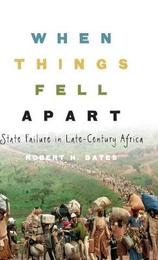
|
When Things Fell Apart: State Failure in Late-Century Africa
Hardback
Main Details
| Title |
When Things Fell Apart: State Failure in Late-Century Africa
|
| Authors and Contributors |
By (author) Robert H. Bates
|
| Series | Cambridge Studies in Comparative Politics |
|---|
| Physical Properties |
| Format:Hardback | | Pages:218 | | Dimensions(mm): Height 216,Width 140 |
|
| ISBN/Barcode |
9780521887359
|
| Classifications | Dewey:321.069 |
|---|
| Audience | | Professional & Vocational | |
|---|
| Illustrations |
12 Tables, unspecified
|
|
Publishing Details |
| Publisher |
Cambridge University Press
|
| Imprint |
Cambridge University Press
|
| Publication Date |
18 February 2008 |
| Publication Country |
United Kingdom
|
Description
In the later decades of the twentieth century, Africa plunged into political chaos. States failed, governments became predators, and citizens took up arms. In When Things Fell Apart, Robert H. Bates advances an exploration of state failure in Africa. In so doing, he not only plumbs the depths of the continent's late-century tragedy, but also the logic of political order and the foundations of the state. This book covers a wide range of territory by drawing on materials from Rwanda, Sudan, Liberia, and Congo. A must-read for scholars and policy makers concerned with political conflict and state failure.
Reviews"Bates has laid bare the reasons that violence has been so prevalent in Africa in the late 20th century. It was not ethnic divisions, nor simply available resource wealth, though both are implicated. Rather, African states, buffeted by adverse impacts of globalization, lacked the revenues to administer their fractious societies. When predation and corruption seemed to offer greater rewards than providing stable administration, state leaders undermined their own economies, eventually provoking conflict and rebellions. Bates's compact account is rich in examples and insights, and supported by the data. He leaves us with a powerful message -- order depends on providing state leaders with the incentives to provide good governance." -Jack Goldstone, George Mason University "An economist who has done development work for several governments and organizations, and much field work in Africa, Bates...constructs a theory of what happened in Africa in the twilight of the 20th century, drawing on the theory of games. Rwanda, Sudan, Liberia, and Congo are his case studies as he looks at the depth of the tragedy, the logic of political order, and the foundations of the state." Book News, Inc. "What accounts for the economic and political collapse of so many African states since independence?...Bates argues that small government revenues in what are relatively poor states, and their heightened volatility after the mid-1970s, shortened the time horizons of politicians and lessened their incentives to act for the public good...Bates concludes that the wave of democratization of the last two decades is unlikely to promote political stability since incumbents will react to this new threat to their hold on power with more corruption and violence." Foreign Affairs
|